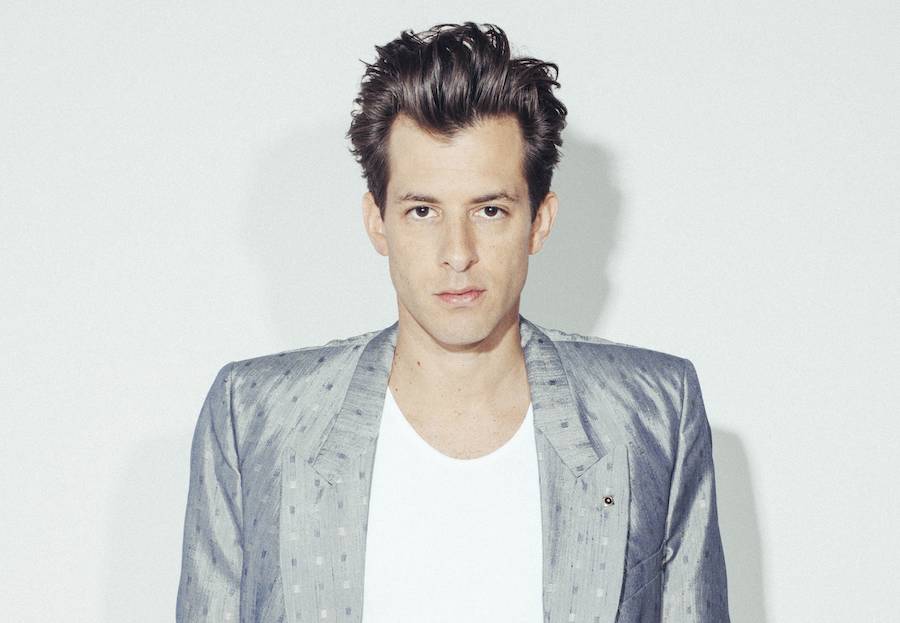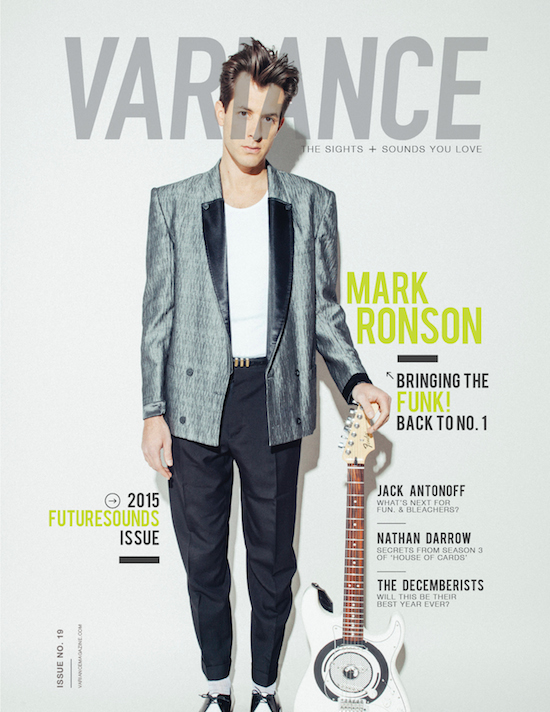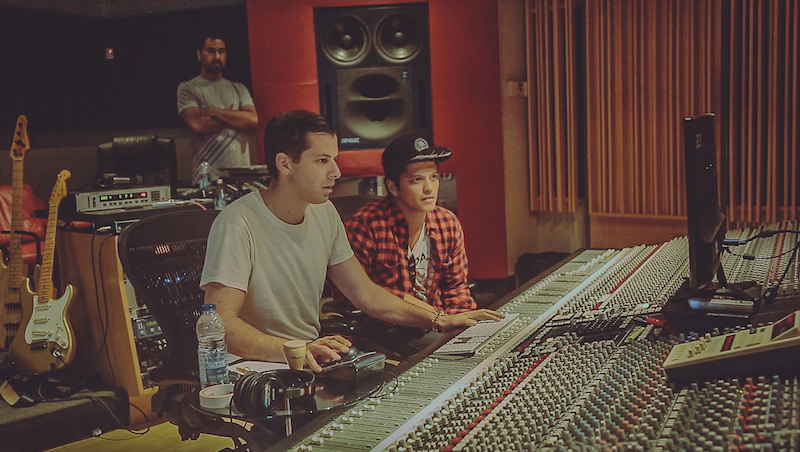
It’s an early winter afternoon and Mark Ronson is a matter of days from releasing what will eventually become his biggest debut in America, Uptown Special.
The first single off the set, “Uptown Funk!,” featuring Bruno Mars, has shaken up the music charts across the globe, reaching No. 1 in 20 countries.
“It’s wild to think about,” he says of the song’s success, in between studio sessions while working with Geoff Zanelli on the soundtrack for Mortdecai, starring Johnny Depp and Ewan McGregor. “There was a lot going on. Bruno was on tour, so he’d get in the studio wherever he could, in London or L.A. or Toronto. And there were so many times we’d leave the studio like, ‘Shit,’ just throwing our hands up. But we did know that if we could get it right, it could be amazing. We spent more time on it than any other song I’ve worked on before.”
 And it’s paid off. “Uptown Funk!” is the British producer-DJ’s first No. 1 as an artist in the States, having dethroned Taylor Swift’s long-reigning “Blank Space” to become the first new chart-topper of 2015.
And it’s paid off. “Uptown Funk!” is the British producer-DJ’s first No. 1 as an artist in the States, having dethroned Taylor Swift’s long-reigning “Blank Space” to become the first new chart-topper of 2015.
“It’s amazing to me that 12 years after my first record, here I am with my first, true hit single in America,” he says, admitting the past few weeks have exceeded his expectations for his career.
In addition to selling tens of thousands of copies of his hit single every week, Ronson recently made his Saturday Night Live debut alongside Mars. A clear benchmark for many artists, the 39-year-old calls the experience “something really special.”
“I grew up in New York since I was eight,” he explains. “[SNL is] such an iconic piece of American pop culture but it’s also such a New York thing. I’m a pop culture junkie. I’ve watched probably 80 percent of the new episodes that have been on since I was about 10 years old. Even now that I live in London, I still download it off iTunes and watch it on Sunday. It’s part of my ritual, so playing it was such a moment for me. I don’t even know how to describe it. But to play with Bruno and his band, they’re just the most enigmatic, fun performers to watch. And it also took off some of the nerves because he’s such a pro and I trust him. It was like going in with your security blanket. He’s just such a dynamic performer.”
An incredibly dynamic performer he certainly is. But while Ronson experiences the biggest Stateside surge of his career, Mars is benefiting just as much from the spotlight. In fact, if “Uptown Funk!” manages to stay atop Billboard’s Hot 100 for seven weeks, it will be his own longest run at No. 1. [Editor's note: This has since been achieved.]
Ronson admits sharing success would understandably be difficult for some, but he’s not concerned about who’s out in front.
"I feel grateful that I’m even on the song at all with this guy who’s been so successful. I’ve never thought about the idea of sharing the spotlight."
“Honestly, I’m sitting here thinking, ‘What did I do to deserve all these great moments?’” he explains candidly. “Bruno has been so selfless though. I mean, he co-produced [‘Uptown Funk!’]. It’s his voice. If we didn’t have the relationship we do, it’d be really easy for an artist to go, ‘Actually, I think I want to save this for my record.’ Tom Petty used to do that all the time. And you can’t blame people. So no, I feel grateful that I’m even on the song at all with this guy who’s been so successful. I’ve never thought about the idea of sharing the spotlight. In my mind, it’s wild that my name is even credited first.”
Ultimately, Ronson says “saving the record” was never really on the table anyway.
“We set out writing intentionally for my record,” he recalls. “But in this industry, you can just imagine how it might go had it been another artist and not Bruno. I had started writing a lot of material early on and then played Bruno and Phil [Lawrence] some of what we had, and we just started jamming. We were in Bruno’s studio in L.A. and he was on drums, Jeff [Bhasker] was on keys and I was on guitar. And it sort of evolved [into ‘Uptown Funk!’], a little from that jam and from something Bruno would do during some of his soundchecks.”
As the song progressed, it became evident they could be on to something. But Ronson admits part of that was likely because of how labor-intensive the track had become.
“I think what happens is, you get these ideas and it’s so exciting,” he says of the experience. “But there’s also so much pressure because you know the potential of what it could be. Out of the first session we got the first verse, but that was it. We didn’t have that vocal bass line; that came later. It’s one of those songs that barely made it out alive.”

The group spent an additional three days in Memphis working on a chorus they ended up scrapping. Ronson says at that point, they were determined to get it right.
“A really classic funk song doesn’t have a chorus in the way a pop song does,” the musician proclaims. “You think of ‘Hollywood Swinging’ by Kool & the Gang. It’s usually just a chant or a horn line that becomes the hook. There were about 15 different hooks that got cut during the process.”
While “Funk!” has become a multi-platinum juggernaut, Ronson knows he’s in the minority in this industry. With the likes of Ellie Goulding’s shimmering Fifty Shades of Grey contribution “Love Me Like You Do” and Swift’s ultra-pop hit “Blank Space” currently competing for buys and listens, a disco-infused dance cut is certainly an exception to the rule. But Ronson says he refused to be swayed by what’s current because “what’s popular changes.”
“EDM and all that is fine but there has to be a sort of alternative for people,” he suggests. “I was DJing recently on a bill with Danny Brown, Rustie, Redlight and producers I really like. And all those acts have this hip-hop spirit but their sound is tough. They’ve got like fucking crazy drums. So I was a little worried about how to start my set in that framework, with 2,500 kids in London on a Saturday night. So I came in with ‘Feel Right’ and went into Bobby Byrd’s ‘I Know You Got Soul,’ and you see these 19-, 20-year-old kids who might have never heard this stuff being so open to it. I’m not trying to convert anyone, but it’s nice because I think sometimes we presume what someone wants to listen to. We don’t give people the chance to like anything else because, ‘Oh, we already know what works.’”
"There's something great about dance music that's live, which doesn't happen anymore. I love DJing myself, but there’s a magic that exists when a live band plays and everyone just fucking dances.”
And according to Ronson, his success combined with an arguably slothful EDM culture hints at another problem.
“People have gotten comfortable with ripping shit off,” he asserts. “Anytime you just rip something off, it’ll come across as uninteresting and there’s no joy in that. There’s something great about dance music that’s live, which doesn’t happen much anymore. I love DJing myself, but there’s a magic that exists when a live band plays and everyone just fucking dances.”
Ronson knows very well there are cynics who despise anything that resembles the so-called “modern retro” sound. But from his perspective, he’s simply making the music he likes.
“I’m not paying homage to anything or trying to recreate something or even competing with the past or myself,” he says. “Like [Amy Winehouse’s album] Back to Black. I produced it but it’s just impossible because so much of that is Amy. And I think it’s safe to say there will never be another Amy Winehouse, another talent so special like that. At least not another one I’ll probably get to work with. She was supremely talented.”
Instead, Ronson says he just focuses on moving forward, learning to expect the unexpected.
“I never thought I’d be able to get Stevie Wonder to my play on one of my records,” he confesses. “He’s one of my favorite singer-songwriter-musicians of all time. I don’t think anyone else stirs me emotionally the way his songs do, so the fact that he’s playing this melody that I wrote—what the fuck, man? The fact that he took the time to go to the studio and lay this down, if I told myself that two years ago, there’s just no way I’d believe it.”
While Ronson has made no secret of his admiration for some of music’s greats and the sounds of the past, part of his own greatness is his ear for right now and perhaps more importantly for the future.
"....Arca or Hudson Mohawke. They’re the future. They’re using technology to do amazing things and they’re bending the very fabric of what we think is a song."
“Pop music has been around now for some 60 years,” he contends. “So there’s always going to be a melody—a chord progression—that sounds familiar. It’s basically mathematically impossible now to come up with something completely new at this point. So what makes the difference now is the production style. The times when I stop and think, ‘This is fresh and innovative,’ are when I hear producers like Arca or Hudson Mohawke. They’re the future. They’re using technology to do amazing things and they’re bending the very fabric of what we think is a song. Before we started using computers to cover up our shit, technology was used to make music better. Now we just use it to make music faster and hide all the imperfections.”
Despite the music industry’s tactics as of late, Ronson is convinced the next few years could prove to deliver some of music’s best.
“We live in a time where so many people aren’t genre-specific, not as rigid when it comes to their musical tastes,” he acknowledges. “I don’t know if people realize how amazing that is. Yeah, there are things we need to sort out, like Spotify royalties and how we adapt to all this available technology. But one amazing thing about the Spotify generation is how all these wonderful sounds and genres can exist together and on the same playlists. I think if you fast-forward five or 10 years, we’ll look at this time in music as the start of something really great.”
Editor's Note: This story appears in its original form in the new issue of Variance.












